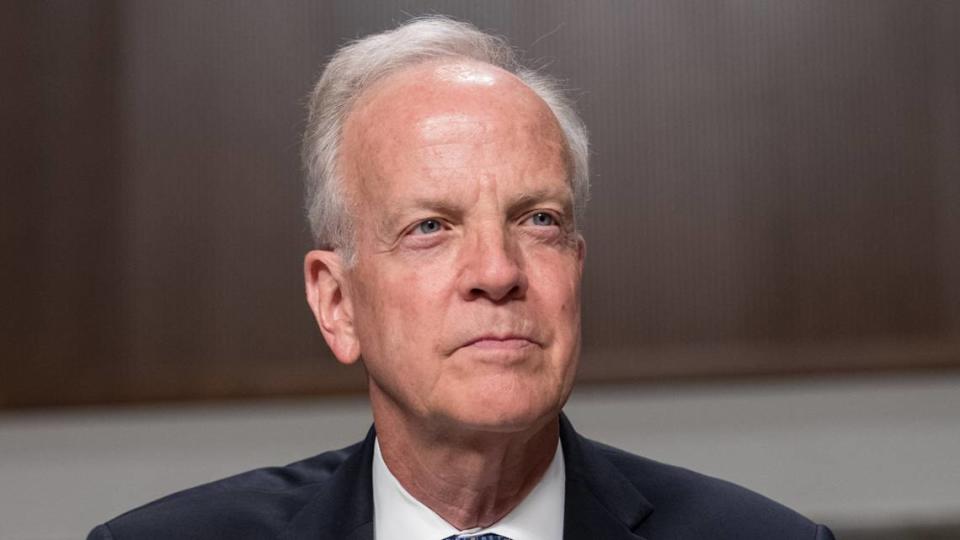The border deal appears dead. These Kansas and Missouri senators are unconcerned
Reality Check is a Star series holding those in power to account and shining a light on their decisions. Have a suggestion for a future story? Email realitycheck@kcstar.com.
Sens. Josh Hawley, Eric Schmitt and Josh Hawley were never likely to support a bipartisan border deal.
Hawley, a Missouri Republican, made it clear from the outset of serious bipartisan negotiations last fall, dismissing the effort as an attempt to justify sending more military aid to Ukraine.
Schmitt and Marshall said they would be open to a deal, but only if it looked like a hardline border bill passed by House Republicans, which Senate Democrats called a non-starter.
So when bipartisan Senate negotiators on Sunday released a $118 billion deal to give military aid to Taiwan, Ukraine and Israel alongside a deal to provide more resources to secure the southern border and ease the immigration process, the three Republican senators from Missouri and Kansas were leading the charge to kill the deal.
The bill is expected to fail a key procedural vote in the Senate on Wednesday – effectively killing months of bipartisan work to reach a border compromise that included stricter policies on asylum that Republicans have generally championed with few major concessions for Democrats. The bill contained no pathway to citizenship for those brought illegally to the United States as children, for instance.
Neither Schmitt, Hawley nor Marshall appeared concerned that they might be rejecting the best deal that they could ever hope to reach with Democrats on border security.
“Joe Biden’s priority has always been Ukraine funding,” said Sen. Roger Marshall, a Kansas Republican. “It’s been a charade of him pretending like he’s negotiating.”
Marshall suggested voters should decide the immigration issue – even though the current Congress is only a little more than halfway over.
“This bill does not secure the border,” Marshall said. “They didn’t come far enough and, in November, Americans will make the final decision of who’s right and who’s wrong.”
Biden, too, said border security would become a key issue in the 2024 presidential election after it became clear the legislation would likely fail.
In a speech from the White House on Tuesday, he pinned the blame for the bill’s failure on former President Donald Trump, who has raged against the deal on social media and in personal conversations with Republicans, saying they would rather weaponize the issue than try to solve it.
“Frankly, they owe it to the American people to show some spine and do what they know to be right,” Biden said.
Marshall, Schmitt and Hawley took issue with several parts of the deal, in particular a provision that would allow the White House to “shut down the border” and refuse to take most asylum cases, when an average of more than 5,000 people attempt to illegally cross in one day.
The Republican lawmakers, who have pushed for the federal government to reject all asylum cases from people who attempt to cross illegally, painted it as a rubber stamp for illegal border crossings, saying it meant the border “never closes.” When it’s not in effect, people would still be able to seek asylum after crossing the border illegally, but non-asylum seekers would still be prevented from entering the country.
Some Senate Democrats, who were skeptical that a deal could be reached, were left angry when their Republican colleagues, including some of the deal’s negotiators, had abandoned the deal in less than 24 hours.
“They want to pretend that they never asked for a bipartisan border bill because what they actually want is chaos,” said Sen. Chris Murphy, a Connecticut Democrat who helped lead the negotiations. “Because that’s what Donald Trump says he wants.”

As the number of people crossing the southern border have increased steadily over the past three years – compounded by crises in central America and the end of COVID-19-era policies that immediately pushed people out of the country when they attempted to cross – Democrats have appeared more willing to address border policy.
Facing pressure from cities like New York and Chicago, where thousands of migrants have been shipped by the governors of southern states like Texas and Florida, the Biden administration has willingly said the immigration system is “broken” and pushed for a compromise.
The result was the most significant bipartisan attempt at immigration reform in a decade. It would have allowed the administration to hire more border patrol agents, immigration judges and asylum officers. It would have also allowed people who crossed the border illegally to work while they await their asylum hearing. It would have also increased the immigrant visas for people who cross the border legally by 250,000 over the next five years.
And it would have authorized Biden to “shut down” the border if more than 5,000 people are trying to enter the country in one day, triggering the “return to Mexico” policy where people are immediately sent out of the United States instead of allowed to wait for an asylum hearing.
“The result of all this hard work is a bipartisan agreement that represents the most fair, humane reforms in our immigration system in a long time and the toughest set of reforms to secure the border ever,” Biden said.

Moran frustrated
Sen. Jerry Moran, a Kansas Republican, appeared drained while walking to the Senate on Tuesday.
He arrived in Washington in 1997, a year after the last time Congress reached a compromise over immigration policy. In the years since, he’s watched several bipartisan attempts to address immigration issues come together only to fall apart. Moran voted against the last immigration effort to clear the Senate, in 2013.
On Tuesday, he was still hoping to give CPR to the bill.
“I am for getting a national security bill that includes the border, Ukraine, Taiwan, China and I’m gonna go talk to my colleagues to see what the path forward is that I can be helpful to accomplish,” Moran said.

But for Marshall, Schmitt and Hawley, the bill didn’t go far enough to reinstate some Trump-era policies. The three lawmakers – along with a large group of other Republican hardliners – instead support a House-passed bill that would impose stricter penalties on people who attempt to enter the country illegally.
Their demands were unlikely to ever be supported by Democrats, who seek to reform the immigration process to allow more people to enter the country legally. Democrats say many of the border policies, including sending people back into Mexico, are inhumane and leave migrants vulnerable to exploitation by drug cartels.
For their part, some Senate liberals also voiced opposition to some components of the deal. A handful of Democrats, like Sen. Alex Padilla, a California Democrat, said they opposed the bill because it didn’t create enough pathways for citizenship.
Schmitt took issue with the fact that the bill grants new powers for asylum agents at the border and that it moved immigration cases out of federal court in Texas and into federal court in Washington. He appeared unconcerned whether it would be the last offer by Democrats.
“They might not” offer a better deal, Schmitt said. “But that shouldn’t compel Republicans to weaken our immigration laws. And if the linchpin here is because Ukraine funding is in the mix, which I think again is a flawed strategy. That isn’t enough for me to want to weaken the border law.”
Hawley said he believed the deal gave too much to the Democrats, called it “terrible for labor” because it allows too many new workers into the country and said it fell short of securing the border. He rejected the notion that both parties had to give a little in a negotiation.
“It does with the current Republican Senate leadership, where you give away the entire store, get nothing from it in return, hang your members out to dry and then say good luck in the next election,” Hawley said.
Coming election
The next election is also looming over the deal. Republicans have made hardline border policy one of their top election issues since Trump made it central to his 2016 campaign.
Trump has repeatedly urged Republicans to oppose the deal, both in statements issued from his campaign and posts to social media. His campaign sent out a fundraising email with the subject line “rip up the immigration bill.”
As Senate Republicans appear to have made it unlikely that Congress finds any compromise on the border this year, House Republicans on Tuesday narrowly failed to impeach Homeland Security Secretary Alejandro Mayorkas, as a handful of members joined the Democrats to oppose the effort.
They also failed to pass a bill that would provide Israel with military defense aid, which was dismissed by Republicans and Democrats as an attempt to avoid support for the larger package that would also help Ukraine and Taiwan.
Meanwhile, the White House has said for months it urgently needs permission to send more to Ukraine, saying that if the Russians are able to take Ukraine and then try to enter a country protected by the North Atlantic Trade Organization, it would be a more costly war that would require American troops on the ground.
Moran indicated he would support a package that just includes funding for Ukraine, Israel and Taiwan.
“We’re never going to have a perfect bill,” Moran said. “Well, that’s an odd thing to say in today’s world. We’ll just continue to try and see if we can get a bill that can pass and become law.”


